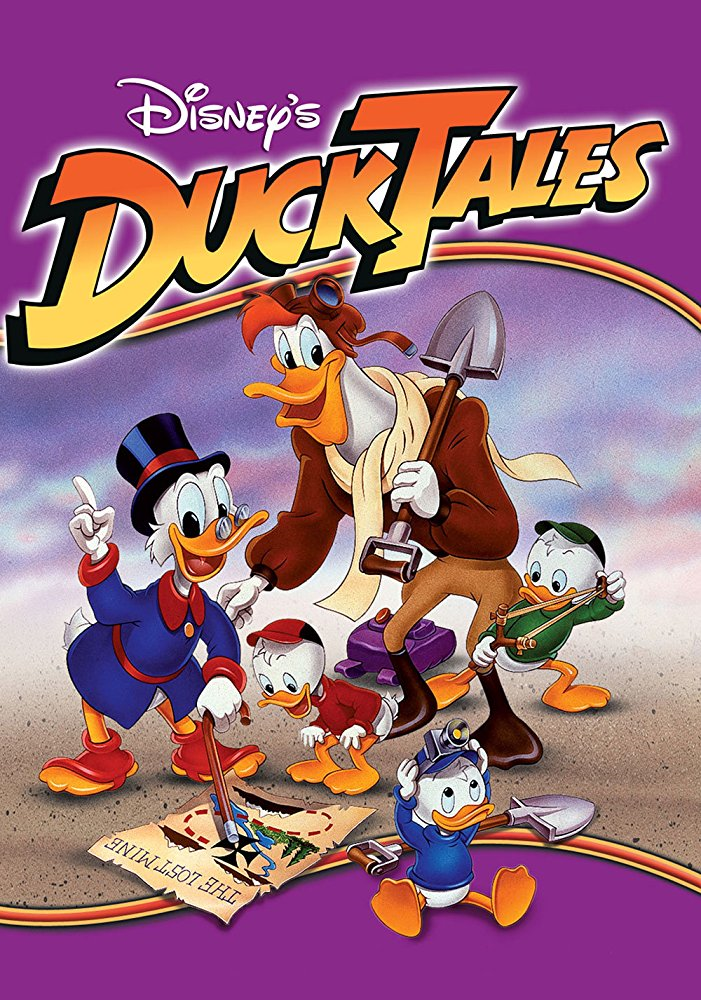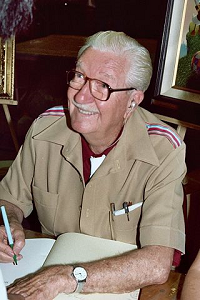Title of the work
Studio / Production Company
Country of the First Edition
Country/countries of popularity
Original Language
First Edition Date
First Edition Details
Originally aired between September 18, 1987 – November 28, 1990.
Running time
Format
Date of the First DVD or VHS
Available Onllne
Disneylife.com (accessed: August 17, 2018).
Season one was also briefly available through streaming services such as Amazon Prime and Netflix.
Awards
Daytime Emmy Awards;
1989 – Outstanding Animated Programming (for Programming One Hour or More) – “Super Ducktales”;
1990 – Oustanding Film Sound Editing – Rich Harrison, Charlie King and Rick Hinson.
Nominated:
Daytime Emmy Awards;
1988 – Outstanding Animated Programming;
1989 – Outstanding Animated Programming;
Listed as 18th best show in IGN’s Top 100 Best Animated TV Shows;
Ranked 1st in WatchMojo.com’s Top Animated Disney Series.
Genre
Animated television programs
Fantasy fiction
Humor
Television series
Target Audience
Crossover (The target audience of the series is for children of all ages and adults, and thus, the show was given a U rating by the BBFC when released on VHS)
Cover

Ducktales Series Poster, under creative commons copyright (accessed: August 17, 2018).
Author of the Entry:
Nanci Santos, University of Roehampton, nancisantos@hotmail.co.uk
Peer-reviewer of the Entry:
Susan Deacy, University of Roehampton, s.deacy@roehampton.ac.uk
Elżbieta Olechowska, University of Warsaw, elzbieta.olechowska@gmail.com

Carls Barks, under creative commons licence (accessed: July 4, 2018).
Carl Barks
, 1901 - 2000
(Artist)
Carl Barks, also known as "The Duck Man", was an American cartoonist from Oregon. He first began working for Disney Studios in 1935 as an "inbetweener". He soon became a story writer for Disney, debuting as the story writer for the Donald Duck haircut scene in Modern Inventions (1937). After leaving Disney for Western Publishing, he created the character Scrooge McDuck, also known as Uncle Scrooge, in 1947. Barks was also responsible for the creation of the various other inhabitants of Duckburg, who featured in the Ducktales series. Throughout his career, Barks received many awards, the most notable being when he became one of the first people to be inducted into the Will Eisner Award Hall of Fame in 1987. He was also given a Duckster Award in 1971 by the Walt Disney Company.
Bio prepared by Nanci Santos, University of Roehampton, nancisantos@hotmail.co.uk

Jymn Magon from his official website, under creative commons licence (accessed: June 28, 2018).
Jymn Magon
, b. 1949
(Artist)
Jymn Magon is an animator from Michigan, born on 7th December 1949. He began his career working for Walt Disney Productions in 1984 as a senior creative manager for TV shows including Ducktales, Adventures of Gummi Bears (1986–1989), and The New Adventures of Winnie the Pooh (1988–1991). In 1993, he left Disney to become a freelancer and became involved in works such as House of Mouse (writer, 2001–2002), and A Goofy Movie (screenplay and story, 1995). He can be found through his website (accessed: June 27, 2018).
Bio prepared by Nanci Santos, University of Roehampton, nancisantos@hotmail.co.uk
Casting
The voice actors include:
Alan Young as Scrooge McDuck,
Russi Taylor as Huey, Louie and Dewey, and
Tony Anselmo as Donald Duck.
Sequels, Prequels and Spin-offs
Comic Books:
Uncle Scrooge Comics by Carls Barks;
Ducktales (Gladstone) Comics;
Ducktales (Disney) Comics;
Disney’s Colossal Comics Collection (Disney);
Uncle Scrooge (Boom! Studio) Comics;
Ducktales (Boom! Studio) Comics.
Video Games:
Ducktales Video game by Capcom;
Ducktales: The Quest for Gold video gameby Incredible Technologies;
Ducktales Remastered video game by WayForward Technologies (by Disney Interactive);
Disney Infinity video game (level with Ducktales characters named ‘Duck Universe’);
Scrooge McDuck character in Kingdom Hearts video game;
Ducktales: Scrooge’s Loot mobile game by Disney Mobile Studios.
Films and TV Series:
Ducktales the Movie: Treasure of the Lost Lamp, 1990 Film;
Ducktales (2017 Reboot) TV Series;
Darkwing Duck TV Series;
Quack Pack TV Series;
Mighty Ducks TV Series.
Summary
Inspired by Carl Banks’ 1947 Uncle Scrooge comics, Ducktales was created by Disney Studios to tell the adventures of Scrooge McDuck, Donald Duck and their three nephews: Huey, Dewey, and Louie. The series begins with Donald Duck being sent to the Navy and entrusting his three nephews to his uncle Scrooge. a billionaire who lives alone in his mansion in Duckburg. Upon being left with his great-nephews, Scrooge McDuck embarks on various adventures with them, occasionally featuring ancient history themes, especially in the following episodes:
Home Sweet Homer (Season 1, Episode 30)
Scrooge McDuck is looking at some of his classic books when Huey, Dewey and Louie arrive with a letter from Donald. Donald discusses how his time has been in the Navy and sends pictures of where he has been. In the background of one of the pictures, Scrooge spots the remains of "Colossus of Duckapopolis" (a reference to the statue "Colossus of Rhodes"), so Scrooge heads off in search of the remains. However, instead of the statue remains, they find themselves transported back in time to "Ithaquack", in 1100BC, when the spell the sorceress Circe was trying to cast upon "King Homer" goes wrong, due to her cat’s interference.
It is noticeable that the main theme of the episode is Homer’s Odyssey. The main characters find King Homer, and travel throughout the sea in search for Circe to undo her spell, thus enabling them to return to modern day. They come across "King Blowhard" (who is likely to be Aeolus)*. They also find the Sirens, much like Ulysses in the Odyssey, who stun Scrooge briefly. In a whirlpool, they encounter the mythical Scylla (or as this episode names her "Yuckalinda"), shortly before finally reaching Circe. After a struggle, they help King Homer to rescue his wife, Queen Ariel, and return to modern day.
Much Ado about Scrooge (Season 1, Episode 23)
The townspeople of Duckburg are fleeing from Filler Brushbill, an incredibly persuasive door-to-door salesman. Despite their best efforts, Dewey lets him in and he attempts to sell them useless items. Amid getting rid of Brushbill’s useless objects, Scrooge McDuck comes across his old copy of Romeo and Juliet by "William Drakespeare", where a note falls from inside that is revealed to be part of a lost play. So, the characters embark on a quest to find the remainder of the lost play. Even though this episode may not relate to Ancient History at first, as the episode progresses, Scrooge and his nephews come across a Roman leader and two Centurions. They later discover that they have landed on an island full of characters from Drakespeare’s plays and thus the Roman army comes from "The Life and Death of Julius Caesar". The identity of the Roman leader is left unclear, however, as the credits merely mention "the Roman character", making it possible to either be Julius Caesar, Mark Anthony or Brutus.**
Aqua Ducks (Season 1, Episode 38)
As part of the series "Catch as Cash Can", Scrooge McDuck is competing against his rival, Flintheart Glomgold, to find out who is the richest man. The previous episode sees Scrooge McDuck's fortune sinking in the depths of the ocean, and so in this episode, Scrooge attempts to retrieve it. He encounters an underwater civilization which imprisons him and his companions, forcing them to work in a junkyard. This junkyard turns out to be in the lost city of Atlantis. Unfortunately, this is the only reference to Greek mythology in the episode as it focuses its attention on Scrooge and his competition with Glomgold.
The Golden Fleecing (Season 1, Episode 41)
Launchpad McQuack, Scrooge McDuck and his nephews go on a journey to the Black Sea to take the Golden Fleece from Jason and the Argonauts. The story begins with Launchpad coming across "Harpies" – half women, half bird creatures – as he flies over the "Valley of the Mists". Upon hearing this, Scrooge decides to go to where Launchpad found the Harpies in the hope of finding the Golden Fleece. Once they reach Colchis, Launchpad is taken away by the Harpies and Scrooge and his nephews search for him. They eventually find him alongside a cave, where the fleece is protected by a dragon, but first they must find their way out of a maze. They do find the exit and the dragon, which they must fight to retrieve the fleece. They do so, however, in their escape, Launchpad is almost killed by the dragon and this prompts Scrooge into covering the dragon with the fleece, enabling their escape. Despite having some elements from the myth of the Golden Fleece, this version takes the Harpies, the Dragon and the cave and creates its own story.
Duck to the Future (Season 1, Episode 52)
Scrooge McDuck travels to the future, thanks to Magicka, to see how his company is doing. Upon landing in the future, he finds out his company is now called "McDuck and Magicka Industries" and it is now a company ran by Louie, Dewey, Huey and Magicka, which only focuses on exploiting people out of their money. He decides to change things, however is unable to do so. He visits old friends in the future, but they are unable to help him. This leaves him turning to Magicka as his last resort. He manages to convince her to come back to the present with him. However, they instead end up in various time periods, of which, one is in the Roman coliseum, right in front of a charging gladiator.
A Ducktales Valentine (Season 3, Episode 18)
This is a Valentine’s special episode heavily featuring Greek and Roman mythology. Scrooge, his nephews, and Launchpad set off to find the lost temple of "Aphroducky", however the only treasure they come across are Cupid’s golden arrows. Despite the disappointment, Scrooge decides to take them, angering Aphroducky and prompting her to appear at Scrooge’s mansion. She is accidentally stung by one of the arrows and falls in love with Scrooge. Scrooge, later in the episode, is also stung with an arrow, falling in love with Aphroducky. It is up to the nephews to break the spell before Vulcan destroys them out of jealousy. This episode is relatively interesting in terms of Classical Antiquity. First, you have the gods from the lost temple, who live in Mount Olympus: Cupid, Aphrodite and Vulcan. It is interesting to note how they interchange the gods between their Greek and Roman equivalents. For example, they use the Greek mythological goddess Aphrodite, but then instead of using Hephaestus, they decided to use Vulcan, and the same with Cupid. This could perhaps be so that they fit jokes and gags better, such is the case with "Aphrodite". They are able to do a wordplay with it, creating "Aphroducky" whereas with her Roman equivalent "Venus" they may not have been as successful. The temple itself is also interesting. It contains statues of the gods mentioned as well as a box with a Greek inscription saying, "The greatest treasure" and once Scrooge opens the box, inside it says "φίλιος" and Scrooge says it means love.
* Mulder, Casie, Ducktales, Cornell College, 2000, available at cornellcollege.edu (accessed August 17, 2018).
** Barat, Chris, "Ducktales Retrospective: Episode 31, 'Much Ado About Scrooge'", News and Views, available at newsandviewsbychrisbarat.blogspot.co.uk, April, 2013 (accessed August 17, 2018).
Analysis
This series is intended for children of all ages, and incorporates Ancient Greek and Roman references to varying degrees. The episode Home Sweet Homer focuses on the Odyssey, and the episode A Ducktales Valentine involves Aphrodite and Greek/Roman gods. DuckTales also has Classical influences through other episodes such as Much Ado about Scrooge, where Roman army appears. The series discusses topics familiar to children and include characters which children would easily recognise such as Homer, Cupid, Aphrodite, the golden fleece, and dragons.
Further Reading
Barat, Chris, "Ducktales Retrospective: Episode 31, 'Much Ado About Scrooge'", News and Views, available at newsandviewsbychrisbarat.blogspot.co.uk, April, 2013 (accessed August 17, 2018).
Earthman, Elise Ann, “The Siren Song That Keeps Us Coming Back: Multicultural Resources for Teaching Classical Mythology”, The English Journal 86.6 (1997) 76–81.
Mulder, Casie, Ducktales, Cornell College, 2000, available at cornellcollege.edu (accessed August 17, 2018).
Addenda
Ducktales is a TV series based on the Uncle Scrooge Comics by Carl Barks (1901–2000).
It was developed by Jymn Magon (1949– ) for Walt Disney Television Animation company.


